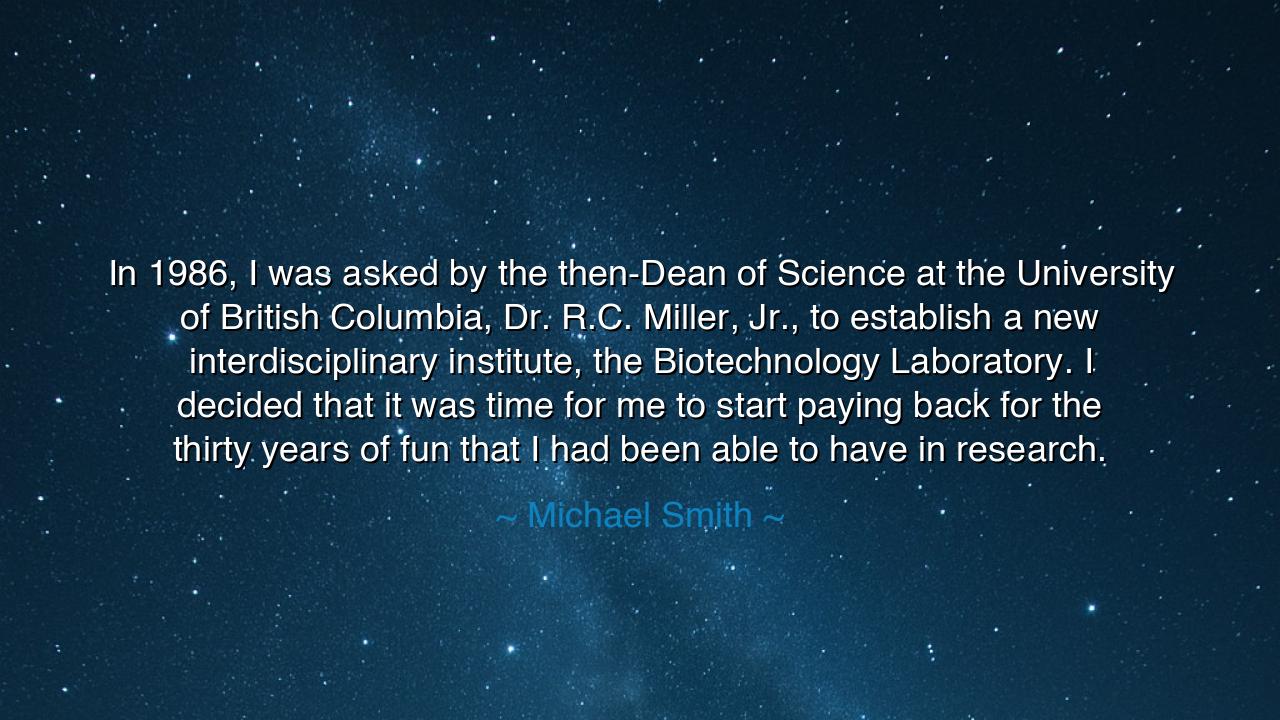
In 1986, I was asked by the then-Dean of Science at the
In 1986, I was asked by the then-Dean of Science at the University of British Columbia, Dr. R.C. Miller, Jr., to establish a new interdisciplinary institute, the Biotechnology Laboratory. I decided that it was time for me to start paying back for the thirty years of fun that I had been able to have in research.






Hear now, O seekers of wisdom, the words of Michael Smith, a man whose life in science was not only about personal achievement, but about giving back to the world that had given him so much: "In 1986, I was asked by the then-Dean of Science at the University of British Columbia, Dr. R.C. Miller, Jr., to establish a new interdisciplinary institute, the Biotechnology Laboratory. I decided that it was time for me to start paying back for the thirty years of fun that I had been able to have in research." These words speak of a turning point, a moment when one reflects on the joys of discovery and feels the weight of responsibility to share that knowledge with the world.
It is a profound truth, O wise ones, that the pursuit of knowledge is not only a journey of self-discovery, but a journey that demands a return to society, a contribution to the greater whole. Smith’s decision to found the Biotechnology Laboratory was not born out of obligation, but of a deep sense of gratitude and a desire to give back. For thirty years, he had been immersed in the joy of scientific discovery, exploring the mysteries of the natural world, and it was now time to take what he had learned and use it to shape the future. The act of paying back was not about repaying a debt, but about ensuring that the next generation could benefit from the fruits of his work, just as he had benefitted from those who came before him.
This, O seekers, is a path that many of the great minds in history have walked. Consider the example of Galileo Galilei, who, after years of studying the heavens, gave the world the telescope—a tool that would revolutionize our understanding of the universe. Galileo did not keep his discoveries to himself; he shared them with the world, knowing that the true power of science lies in its ability to elevate all of humanity. Like Galileo, Smith understood that the greatest gift one can give is not simply the knowledge one gains, but the knowledge shared. His work in biotechnology was not only about the advancement of science, but about laying the foundation for future generations to build upon.
Let us also remember the great Marie Curie, who, after discovering radium and polonium, did not keep her discoveries hidden away in the confines of her laboratory. She shared her knowledge with the world, even when it was dangerous, because she understood that the advancement of humanity was more important than personal gain. Her legacy is one of selflessness, of a willingness to give all that she had for the betterment of mankind. In the same spirit, Smith saw the joy of his research not as a private treasure but as a gift to be shared with the world, a gift that could have far-reaching effects in the realm of biotechnology.
The lesson here, O wise ones, is one of service. Science is not a pursuit of personal glory, but a service to the world. Every discovery, every breakthrough, is a step forward not only for the individual, but for all of humanity. Smith knew that his time in the lab had been filled with joy and adventure, but that the true fulfillment of that journey lay in what he could pass on. Just as Galileo, Curie, and countless others before him gave their knowledge to the world, so too must we recognize that the true value of our pursuits lies in how we use them to elevate the lives of others.
Thus, the lesson for us, O seekers of knowledge, is this: the pursuit of science is not merely a personal endeavor. It is a responsibility, a sacred duty to share our discoveries with the world, to ensure that those who come after us are able to build upon the foundation we have laid. Just as Smith chose to give back by establishing a Biotechnology Laboratory, so must we ask ourselves how we can contribute to the greater good. Whether in science, art, or any other endeavor, we must seek not only our own fulfillment, but the upliftment of humanity.
And so, I call upon you, O wise ones, to reflect on your own work, your own journey. What knowledge have you gained, and how can you share it with those who come after you? Do not let your discoveries remain locked away in solitude, but open the door for others to walk through. In this way, we honor those who came before us, and we ensure that the future will be brighter, not because of what we have gained for ourselves, but because of what we have given to the world. Let gratitude and service guide your every step, and in this way, leave a legacy that will endure beyond your lifetime.






AAdministratorAdministrator
Welcome, honored guests. Please leave a comment, we will respond soon